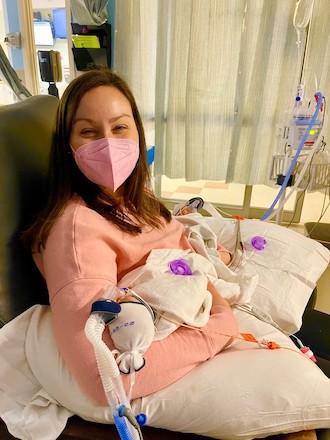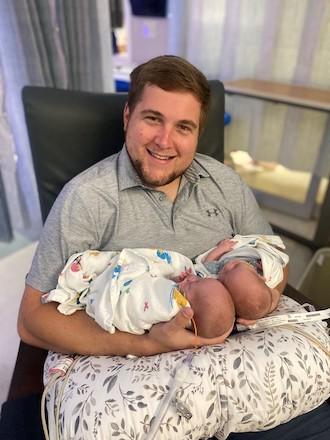It was worth every mile


Topics
It’s a long drive from Dalhart in the Texas panhandle, the northern most part of the state, to Houston.
Approximately 600 miles.
But that’s exactly the drive doctors told the DeJong family they needed to make to save their twins’ lives.
When she was 18 weeks pregnant, Jessica DeJong and her husband, Patrick, received some dire news about the health of their twin daughters. Cornelia and Eleanor were showing signs of twin to twin transfusion syndrome (TTTS), which — if left untreated — can be life-threatening for one or both babies.
Jessica’s obstetrician noticed that Cornelia had too much amniotic fluid around her, while Eleanor had too little.
“She immediately recommended that we see a maternal fetal medicine specialist in Lubbock,” Jessica said. “That’s where we underwent an anatomy scan that validated the concerns about TTTS, and we were immediately referred to Texas Children’s Fetal Center.”

Just a few days later, at 20 weeks pregnant, Jessica had laser ablation surgery to separate her placenta and an amnio reduction to distribute the fluid more evenly between her daughters. Dr. Roopali Donepudi, a fetal surgeon at Texas Children’s Fetal Center and Assistant Professor at Baylor College of Medicine, was the surgeon on her case.
“In pregnancies with identical twins, there can be a problem with unequal sharing between the twins,” Donepudi said. “Sometimes the fluid, and therefore the nutrients, are not shared properly between the babies. They are getting what they need from their mother, but are not sharing it equally with each other. To correct this, we close the connections between them, and this surgery is what makes it possible for the babies to grow and develop in a healthy way.”
Donepudi added that the potential for TTTS is one of the reasons screening is extremely important when a woman is pregnant with twins. Mothers who are pregnant with twins should begin seeing a specialist at 16 weeks. In the DeJongs’ case, TTTS was discovered at stage 1, and Jessica was able to have the surgery early before the twins became too ill.

“The success of these surgeries at Texas Children’s can be attributed to the incredibly strong multidisciplinary team we have at the Fetal Center,” Donepudi added. “The group in the operating room, the nurses, the coordinators and our research team all contribute to helping our families.”
When Jessica takes time to stop and reflect, she thinks about one thing in particular — and that’s how so many people played a role in their story.
“I can’t say enough good things about the Texas Children’s team,” she said. “They were fantastic. This surgery ensured that each of the girls had what they needed to survive. Once it was complete, we returned to Dalhart and continued the rest of my care at home.”
Amber Cordero, the DeJongs’ nurse coordinator at Texas Children’s, worked with the family to provide support during this difficult time. She not only offered information and resources while they were in town, but also followed up with Jessica regularly after she returned to the care of her hometown providers.
“We are a referral center,” Cordero said. “So for us, it’s very common for families to travel from far away for evaluation and treatment of TTTS. We get referrals from as far north as South Carolina and as far west as El Paso. We also see several patients from the lower East Coast and along the Gulf Coast states — and some from across the globe. We are always honored that these families travel so far to be in our care.”

On April 25, at 27 weeks, Cornelia (nicknamed Nellie) and Eleanor (nicknamed Nora) were born at Northwest Texas Hospital in Amarillo. After a weeks-long stay in the neonatal intensive care unit to make sure they were 100 percent ready to go home, they did just that.
“We now have two beautiful healthy girls, and I wasn’t always sure I’d be able to say that,” Jessica said. “If it weren’t for Texas Children’s, I’m not sure my girls would have made it. It was worth every mile.”
